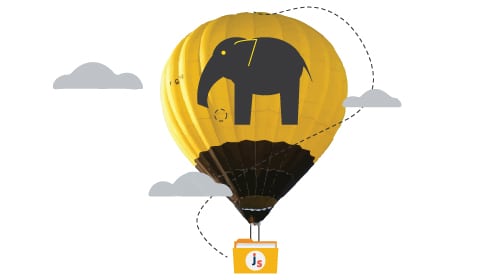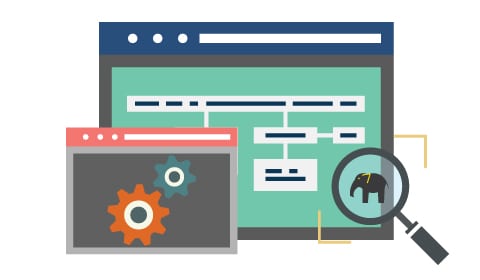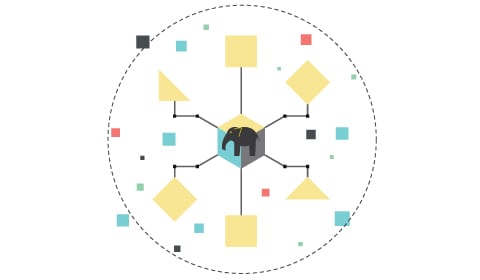Microsoft Azure Data Engineering Training Cou ...
- 15k Enrolled Learners
- Weekend
- Live Class
Most of us know the story of the woodcutter, who went to work for a timber merchant. His salary was based on the number of trees he could cut for the day. On the first day, he could cut 20 trees. Happy with the result, and even more motivated, he tried harder the next day and came back with 30 trees. However, his success was short-lived. After a week, the number of trees he was cutting was dwindling. “I must be losing my strength,” the woodcutter thought. He decided to go and see his boss and apologized for not living up to the expectations. He was taken aback, when his boss asked him,
“When did you last sharpen your axe?”
He replied, “I have been busy cutting more trees for you and I just did not have the time to sharpen my axe.”
Cut to modern world: I am sure many of us can relate to this story to some extent. What is crystal clear is this: the axe — or in today’s context, technology — needs to be upgraded constantly, without which progress is impossible.
Most of the companies today are waking up to the needs of technology across all domains and reaping the benefits. Let’s take the example of book retailers. Earlier, traditional booksellers in stores could easily track which books were popular and which were not, based on the number of those particular books sold. If there was a loyalty program, they could tie some of those purchases to individual customers. That was just it.
But once the focus was on online shopping, there has been a 360 degree turnaround in understanding customers. Online retailers — the biggest example being Amazon — were able to track not only what customers bought, but also their viewing history; how did they navigate; how did the reviews, page layout and promotions influence them. They even came up with algorithms to predict which book a particular customer would love to read next. Booksellers in physical stores just could not have this kind of information.
No prizes for guessing why Amazon pushed several bookstores out of business. It is evident that it tapped in to the need to manage its volumes of customer data that was being overlooked by the traditional booksellers.
This is where big data comes into the picture. The hype surrounding big data is not just hype. We now live in a world that is dominated by big data, whether we accept the fact or not. The amount of data doubling every day across the world is undeniable. Pat Gelsinger, the CEO of VMware, has rightly said, “Data is the new science. Big data holds the answers.” Using that data effectively is the crux of the matter.
Companies like Facebook and Twitter have been efficiently using big data for quite some time now. Today, organizations across all domains whether big MNCs or startups — be it social media or health care or finance or airlines — are embracing the big data wave and are investing big time in it. The domino effect of these upgrades and new initiatives are bringing in a lot of changes in job titles and job roles.
But the big question is: Are professionals ready to upgrade to the latest technology and take up new challenges? Shifting to big data is imperative, as it touches nearly every aspect of our lives, whether we realize it or not.
Technology moves at a very fast pace. And, if a Java professional is still fiddling with Java 1.3 code, he needs to look past and upgrade to the most up-to-date technology. Big data and Hadoop are synonymous. Going by the demand and the growing popularity, Hadoop, an open-source — Java-based programming structure — rules the market today. International Data Corporation predicts that the big data and Hadoop market worldwide will hit the $23.8 billion mark by 2016.

Is it prudent for a Software testing professional to jump the Hadoop bandwagon? The answer, I am sure, will be ‘yes’ for many. A testing professional’s job, which entails ironing out bugs and improving the quality of the finished product, can get monotonous at times. He may feel stuck in the rut after a point doing the same kind of work day in and day out. This is when the need to upgrade his skills to big data and Hadoop can come in handy. His realm of opportunities will also open up.

Even a mainframe professional’s work involves bulk data processing. And, handling volumes of unstructured data can be time consuming besides getting monotonous. Take the case of a person, who is involved in census data processing in mainframe. His job includes monitoring and collecting questionnaires, checking, data entry, storage, tabulation etc. This can get mind boggling, right? The process is not only time consuming, but also expensive. Hadoop being an open-source platform can be the most viable alternative to manage volumes of data for him. With Hadoop he will also have better career opportunities that are increasing by the day.

What about the data warehousing professional and the ETL developer, who handle loads and loads of data? Given the enormous flow of data today, they get so caught up in this data that their work is restricted to just handling the flow of data. But by upgrading to Hadoop, these professionals can effortlessly handle volumes of data. Also, how can they forget the big opportunities in the data management sector?

There is also the Business Intelligence professional whose challenge lies in storing Big Data. For example, in an advertising agency, he will constantly need answers to analytic questions, such as: What drives people to certain content? What’s their profile? How do we draw more people to an area? It is only with the help of Hadoop that he can scale up and deliver good answers frequently.

Whether you are a Java professional or a software testing engineer or business intelligence professional, there is no debating the fact that big data technologies are becoming a common accompaniment. Therefore, you need to look beyond and upgrade to the challenges of big data technologies. Lest, you become like the woodcutter who was so busy felling trees that he forgot to sharpen his axe.
Is your profession/doma
If you also want to learn Big data and make your career in it then I would suggest you must take up the following Big Data Architect Certification.
Got a question for us? Mention them in the comments section and we will get back to you.
Related Posts:
All You Need to Know About Hadoop
 Thank you for registering Join Edureka Meetup community for 100+ Free Webinars each month JOIN MEETUP GROUP
Thank you for registering Join Edureka Meetup community for 100+ Free Webinars each month JOIN MEETUP GROUPedureka.co
Hi There, I am B COM graduate and working as a Management Information Analyst and my work is to extract the data and prepare a reports for the management team to help to make business strategy to run the business … help me to how Big Data is relevant for me…..
Hi can anybody help me on this……???
Thanks
Hi Chetan, since you are dealing with data, you can delve in to Big Data Analytics. ‘Business Analytics with R’ would be the recommended course for you. You can check out this link for more information: https://www.edureka.co/data-analytics-with-r-certification-training . Please do contact us in case of further clarifications.
Hi Edureka,
I have 4 years of work Exp in EMC Documentum as an Admin. It involves Java. From your forums/pages I could understand I am eligible for switching to Hadoop. My biggest concern is, whether an employer will be ready to employ me after I successfully complete training with Edureka? As an employer’s standpoint, I feel they would look for experienced people who have hands-on experience (which obviously I won’t have merely with a certification) rather they can go in market and recruit freshers and train them. What added advantages will I have over freshers?Will my previous work ex will be counted? Please advise.
Sincerely.
Hi Novice, Of course, your previous experience will be an added advantage. since Hadoop is a relatively new technology employers are not looking for total experience in it. They are looking for hands-on experience which you can have by completing projects and assignments given to your during your training at Edureka. The Edureka certification is provided only after successful completion of these project and assignments. These project and assignments gives you a hands-on experience and mentioning them in your resume will definitely get you noticed by the recruiters.
Of course, your previous experience will be an added advantage.
Any further clarifications, you can call us at US: 1800 275 9730 (Toll Free) or India: +91 88808 62004
Hello,
I am Krishna,working as a SAP FICO Consultant with 6.5 years in it.I have come across different new technologies around me,few of those are SAP HANA,HADOOP, etc.I would like to know which one of these will suit to my profile (I am a B.Tech grad).Also,could you please let me know the roles of these profiles which I can see in wbsites.
1.Data Scitist
2.Big data architech
3.Big data solution architect
4.Big Data analyst
5.Big data developer
6.Big data analyst
What is the roles of these people?I am a functional consultant in SAP so I am not sure about the roles of these profile.
Looking forward for your information
Thanks!
Regards
Krishna
Hi Krishna, all of the job titles you had mentioned are technical in nature and requires knowledge in Core Java. Data Science training can help you become a Data Scientist. The prerequisite for this course is familiarity with Hadoop, Machine Learning and knowledge of R and Statistics will be an added advantage.
It would be great if you could call us as your query requires more clarity and we can discuss about this. You can contact us at US: 1800 275 9730 (Toll Free) or India: +91 88808 62004
I have about 5 years exp in mainframe after which I have been on a personal break for the last 5 years. What would be the chances of me finding a job in the field of data / business analytics if I do a course in the same field? What are the pre requisites for learning data analytics tools?
Hi Jo, if you are interested to enter in to Big Data and Hadoop field, you can for ‘Big Data & Hadoop’ course. The prerequisite for this course is knowledge in core Java. If you are interested in Analytics, you can take up ‘Business Analytics with R’ . The prerequisite for this course in knowledge in statistics and good analytical skills. We provide a complimentary course ‘Statistics Essentials for R’ along with this course. This will help you brush up your statistics skills.
Please fell free to call us at US: 1800 275 9730 (Toll Free) or India: +91 88808 62004 or go through this link for more information: https://www.edureka.co/data-analytics-with-r-certification-training .
hello, I am currently working in an organisation as a business analyst, my work comprising mostly of market research and MS excel. I have a degree of BBM, specialised in Marketing. I don’t have much knowledge about programming languages like C, Java etc.
But analysis interests me and big data looks like the future. I want to learn Big data and Hadoop for my career enhancement. Please guide.
Hello Anshuman, thank you for reaching out. To answer your query, instead of focusing on Hadoop you could start with Business Analytics with R which is the preferred platform for Market Research professionals when it comes to Big Data Analytics. Since you are already working in Market Research, you would be familiar with statistical concepts which will help you in learning this course. To know more about the course check out https://www.edureka.co/data-analytics-with-r-certification-training. This is one of the best way to get into Big data from your position and the level for programming is very basic in the R software. Also you can check out our blog on why marketing professionals should learn R: https://www.edureka.co/blog/r-for-marketing-professionals/. Moreover, Hadoop requires knowledge on core Java, so you will need to learn Java. Please feel free to call us at US: 1800 275 9730 (Toll Free) or India: +91 88808 62004 to discuss this in detail.
How relevant would it be for a sales professional with 4+years of sales experience to learn Hadoop?
Hi Archana, we need more clarity regarding your professional background. Please feel free to call us at US: 1800 275 9730 (Toll Free) or India: +91 88808 62004 to discuss about this in detail.
Hi, i am having 3 yrs of exp in LAMP, and baiscs of java, May i know After completion of this course,priorities for job will be given to experienced people how come it will be helpfull for us as a fresher , are we going to receive placement assistance after completing this course.
Hi Pankaj, Hadoop is relatively new in the market and there are lot of job opportunities for professionals with experience like you. And what we are seeing as of now is just a start and there is a lot of potential for professionals who will be the early movers in Big Data space. The only prerequisite for learning Hadoop is Core Java knowledge.
To answer your 2nd question: We are not in to direct placement, but we will help you with restructuring your resume and also share the FAQs in the interview. For more information you can go through this link: https://www.edureka.co/big-data-hadoop-training-certification or call us at US: 1800 275 9730 (Toll Free) or India: +91 88808 62004
Hi I’m b.tech biotechnology. Is there any job opportunity for me as a fresher in hadoop?
Pl can u just answer
Hi Vidya,Hadoop is relatively new in the market and there are lot of job opportunities. So learning Hadoop is a good move. The only prerequisite for learning Hadoop is knowledge in core Java. We also provide a complimentary course ‘ comprehensive Java’ which will help you learn Core Java, which is essential for learning mapreduce concepts in Hadoop. I’m sure you have more questions for us. You can call us at US: 1800 275 9730 (Toll Free) or India: +91 88808 62004 for any clarifications.
I am a Microsoft .Net engineer with an MBA degree
Hi Shailesh, we have responded to your query. In case of further clarifications, feels free to call us at at US: 1800 275 9730 (Toll Free) or India: +91 88808 62004 to discuss in detail.
@Edureka support: Plz post ur reply here for this question…
Hi team,,I worked as a security delivery specialist almost a year back…….now planning to work again however i want to change my domain to Hadoop..please suggest
Hi Pallavi, the prerequisite for learning Hadoop is knowledge in Core Java. it would be great if you could provide more information regarding your
professional background so that we can provide a precise response to
your query. You can also call us at US: 1800 275 9730 (Toll Free) or
India: +91 88808 62004 for further clarifications.